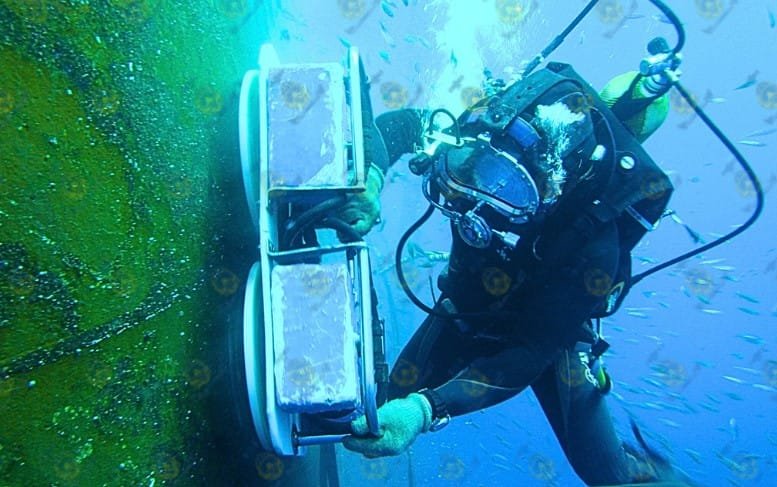The maritime industry is the backbone of global trade, facilitating the transport of nearly 90% of the world’s goods. From essential commodities like oil and grain to the consumer products we rely on daily, shipping is indispensable to the smooth functioning of the global economy.
As demand for maritime transport continues to grow, the pressure on vessels to operate efficiently, reliably and sustainably has never been greater. Maintaining this momentum, however, requires more than just keeping vessels operational—it demands specialised care for the parts of the vessel that remain submerged.
These underwater components, including the hull, propellers and rudders, face the harshest conditions at sea. Exposure to saltwater, biofouling and physical wear can severely impact their performance, resulting in increased fuel consumption, slower speeds and costly delays that ripple through the global trade network.
In this article, we’ll explore the key role of underwater maintenance and its impact on modern shipping.
What are Underwater Marine Services?
Underwater marine services encompass a wide range of specialised activities designed to maintain and repair vessels at or below the waterline. These services, performed by highly trained professionals, address critical areas such as hulls, propellers, rudders and other submerged components.
It is quickly becoming industry standard for vessel owners to enlist specialist underwater marine services companies to perform these duties, due to their expertise in handling the potential dangers of ocean environments.
Key responsibilities include:
- Hull Cleaning and Propeller Polishing – Removes biofouling and debris from hulls and propellers to optimise vessel performance.
- Underwater Welding and Cutting – Carries out structural repairs and modifications to submerged ship components and offshore structures.
- Underwater Inspection and Survey – Detects and prevents potential issues in underwater components through detailed assessments.
- Installation and Maintenance of Navigation Systems – Ensures the accurate setup and ongoing upkeep of critical navigation technologies.
These tasks are essential for preserving the performance, safety and lifespan of submerged structures, making underwater marine services a critical component of modern shipping operations.
What are the Advantages of Underwater Marine Maintenance?
Enhancing Operational Efficiency by Minimising Downtime
In the fast-paced shipping industry, time is money, and any delays can have cascading effects on supply chains. One of the most significant advantages of underwater marine services is their ability to perform maintenance and repairs while the vessel remains submerged. This eliminates the need for costly and time-consuming dry docking in many cases, allowing ships to remain operational and on schedule.
Routine services such as hull cleaning and propeller polishing are conducted swiftly, often during short port stays or while anchored, ensuring minimal disruption to operations. Emergency repairs, such as addressing hull breaches or rudder damage, can be performed directly in the water, enabling vessels to quickly resume their voyages. This not only reduces the need for costly repairs or replacements but also ensures that vessel owners meet contractual obligations and avoid penalties associated with delays.
Promoting Sustainability Through Fuel Efficiency
With the maritime industry under increasing pressure to reduce its environmental impact, underwater marine services play a vital role in promoting sustainability. By removing biofouling and other debris from hulls and propellers, these services significantly improve a vessel’s hydrodynamic performance. This reduction in drag leads to lower fuel consumption, which translates into fewer greenhouse gas emissions.
Sustainability is further supported through the use of eco-friendly cleaning solutions and advanced technologies that minimise the impact of maintenance activities on marine ecosystems. By keeping vessels in optimal condition, underwater services help shipping companies align with international regulations such as the IMO’s decarbonisation targets, contributing to a cleaner, greener maritime industry.
Ensuring Safety for Crews and Cargo
The safety of a vessel, its crew and its cargo relies heavily on the integrity of its underwater structures. Constant exposure to saltwater, pressure and marine organisms accelerates wear and tear, creating risks that can compromise stability, lead to equipment failure or even result in accidents at sea. Proactive underwater marine services are essential for addressing these risks, providing maintenance and repairs that ensure vessels remain safe and operational.
Services such as underwater welding and structural inspections detect and address issues like corrosion and damage before they escalate into critical problems. By preventing failures in submerged components, these services protect not only the lives of those onboard but also the cargo and operations they support. By prioritising safety through high-quality underwater maintenance, shipping companies build trust with clients and stakeholders, reinforcing their commitment to operational excellence and reliability.
Ensuring Compliance with International Regulations
The maritime industry operates under strict international regulations governing vessel safety, performance and environmental impact. Non-compliance can result in hefty fines, vessel detentions and reputational damage. Underwater marine services are integral to helping vessel owners meet these requirements by maintaining the structural integrity and efficiency of submerged components.
Underwater inspections and surveys provide the documentation needed to satisfy regulatory bodies and classification societies. Additionally, services such as hull cleaning and propeller polishing ensure compliance with environmental regulations by preventing invasive species from spreading and minimising emissions. By working with expert underwater service providers, shipowners can navigate the complex regulatory landscape with confidence, avoiding costly penalties and ensuring smooth operations.
Final Thoughts
Underwater marine services play a vital role in maintaining the global trade network’s momentum, and advancements in technology are set to enhance the precision, efficiency and safety of underwater maintenance even further. As the maritime industry evolves, investing in these innovative services will be key to overcoming future challenges, ensuring vessels can continue to meet the demands of modern shipping and navigate the world’s oceans reliably and sustainably for years to come.






